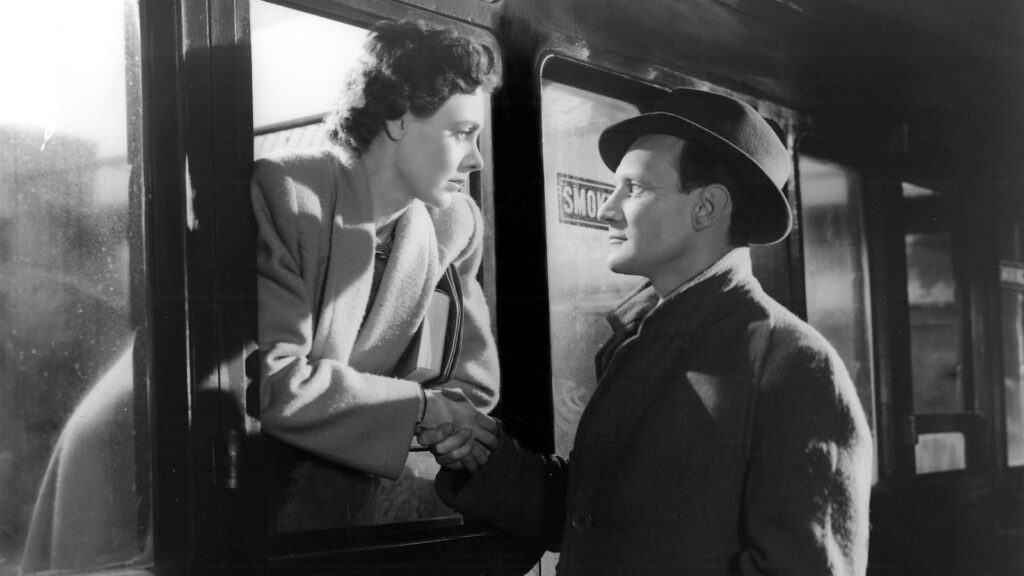I met the most beautiful girl on the train. We locked eyes, had a moment […] Then we did that romantic thing where we never see each other again.
Joel Dommett (British comedian)

At one point in American culture, trains were a commonplace component of everyday life.
Following the French and Indian wars, railway transportation continued to climb as an accessible way of transport. Railway construction continued, later connecting California to Iowa during the Civil War. Wanna visit your cousin in San Francisco, but happen to live in Boston? Well, after 1869 you could. The establishment of freight and passenger lines helped industrialize the Northeast, while allowing settlement of the untamed West. The advent of the transcontinental trains stretching across the states provided job opportunities for work on the railroads themselves, encouraging numerous immigrants to come (most notably those from Ireland and China) involuntarily instituting economic and social changes due to the acute influx of populations.
But by the first decade of the twentieth century, airplanes and automobiles were fair players as far as passengers were concerned. Yet by 1950, diesel trucks dominated freight. Commuters used buses and cars. By the twentieth century, trains were no longer necessary for the average American to work or travel.
At some point, the notion of one “taking a train” was out of the norm, becoming more and more a representation of where the extraordinary can — in spite of the common place, and not because of it — occur. Perhaps the hit mysteries Murder on the Orient Express (1934) and The Thin Man (1934) set the stage for exciting events to occur via railway. The comedy film Throw Momma from the Train plays into this, the story exploring a murder mixup setup with a hapless writer and his odd student.
Brief Encounter (1945), thought of by some to be the most romantic movie of all time, begins their affair with a chance meeting at a train station. Some like it Hot (1959) starring Marilyn Monroe was cited as the source of the American young woman’s dream, according to Sex & the City. With one friend encouraging another to take the train with her to California, she cites the misadventures of Miss Monroe as a possibility for their own romantic escape. Indeed, the hero of Shadows of the Sun (2005) leaves the small country town in Italy, the film ending with his newfound love chasing alongside, beckoning him to leave the track his life was on (pun intended) and embrace the unknown.
As cliché as that image may seem or be, it gets me every time.
But the limitless possibilities of the liminal aren’t limited to the romantic genre, per se. More masculine interpretations include Snowpiercer, a science fiction dystopia where class systems coexist onboard a perpetually circumnavigating super locomotive. Train to Busan features average train-goers fighting for survival in the midst of a zombie outbreak. In Bullet Train, assassins meet together for one final showdown over the course of one long ride. Heck, even the USA hit network series The Dead Zone did a train-based episode, with the psychic protagonist Johnny Smith to save a mysterious woman from being thrown off the side.
Yet clichés are born of familiarity. And that familiarity, in turn, becomes the basis of culturally-accepted fact. Yet the fact remains: whatever common role trains may have once had in the American experience, it is now uncommon. And the uncommon by its very nature, makes it unique, even magical. Perhaps the excitement and passion isn’t aroused by the loud locomotive sounds and sights alone. The crossing of railways represents the passenger themselves at a literal crossroad and on a physical journey, externalizing their inner decisions and travels. In this way the liminal space unleashes its potential for identity, change, and possibility. Anything can happen, we Americans whisper to ourselves. Which brings me back to the teeny tiny town of Soderhamn in its teenier, tinier train station.
The term “station” was generous. It was a stop to be sure, with an indoor ticketing kiosk. There were metal benches outside the building, and a small parking lot. Up the stairs and a little ways apart stood the platform, a no-nonsense concrete slab. The bench, if there was one, was covered by the teeming crowd around me.
I shifted, setting my pack on the ground. Two minutes, my phone confirmed. Two minutes and I would be on the train back to Stockholm. I took a good look at the farewell party of four, forming a semi-circle around me. It would have been seven, but the boys were on early morning fence-mending duty with Oke, with Roberto on morning feeding shift. We’d said our goodbyes the night before at family dinner.
. . . . .
“Breakfast for dinner.” Victor repeated the phrase, in disbelief. “I’ve heard of it before, but thought it was something made up in the movies.”
I chuckled at that. Having made more midnight trips to IHOP and Denny’s than I could count, I assured him any classic American diner would most likely offer breakfast on the menu, regardless of the time of day or night. For this family dinner, I was cooking up chicken ‘n waffles – the waffles substituted with pancakes, since no waffle iron could be found. But not just any pancakes.
“Banana pancakes,” I clarified to Maria, flipping them on the pan.
“Just like the song,” she exclaimed with a delighted smile, catching my wink. With the chicken dredged and in the oven, Roberto volunteered to do the scramble eggs. For our number of people, it was in one gigantic skillet.
We all crammed around the table, even the new guy Caillou. He was from Brazil. The same city as Roberto, in fact, which he marveled at. Roberto’s English was impeccable, but it was nice to see he could let loose and speak his native tongue. Caillou on the other hand was not comfortable with speaking English, but he could understand well enough. Everyone sat down, just as the chicken came out of the oven. Even Olle showed up on time, dressed for a formal occasion in a suit and tie. The spread covered the table, the different-sized plates around the perimeter with enough space for forks and glasses, but only just.
“This calls for drinks,” Olle happily announced. Turns out Caillou was from some wealthy family who happened to own a vineyard and wine brand. He had brought one for Olle, and in turn us, to share. The wine swirled in its glass. Speech, I called out, the word echoing. There was a nice speech, which I can;t remember for the life of me. But when I think of it, I recall most of all two words.
“To family,” he toasted.
“To family.”
Then we sang that one snapsvisor, the one all the foreigners do (which included me). I had just enough battery on my phone to google the words.
“And since you don’t drink alcohol, we something at System Bologet for you, too.” With a flourish, Victor and Francesco pulled out a can of a non-alcoholic beverage. I think it was chocolate beer, which was quite bubbly and yummy. It was delicious, perfect pairing for pancakes and peanut butter.
Then playing cards were brought out, with shouts of “Cuadrado!” quickly filling up the room. Laughter echoed off of the walls. Small talk in various accents filled the spaces, warming it more than the fireplace with its crackling wood could. I leaned back to watch it all as one apart, taking in every detail, soaking in the sounds and feeling. So this is family, I think to myself. So this is love. Its warmth stayed with me even when I went to bed, carrying me away to a deep and dreamless sleep.
The next morning was so very different.
I accidentally slept in. Packing my crap was, as per usual, a minor shit show. What with sorting through clothing to leave for donations, throwing away scrap trash paper notes on the floor, making sure the sleeping bag was tightly rolled away in its casing, washing the sheets, tidying the space and re-rolling every piece of clothing I owned. . . To say my pack and computer bag were travel-ready would be rounding waaay up in the glass half-full type deal. I was shoving and fitting stuff in as quickly as possible, which was not at all organized. If I missed my train, that would be 30 or 40 USD down the drain. That, and something else.
I have this theory on magic. By that I mean the feeling of something, the silent yet undeniable feeling or vibe. Maybe it’s energy. Whatever the name, call it what you will, every space is filled with matter, and matter produces energy. There’s a sort of energy/magic that inhabits a space. As sure as you can feel something leading you on the way to a destination, you can feel it leaving, too. Your intuition knows when it’s your time to go, and when it’s going. The magic of the night before was gone, or at least mute. When I entered the kitchen lugging my bags, it was cold and dark. Which was odd, since it wasn’t rainy. Victor and Francesco were sitting at the table in gloomy silence, one uncomfortable even for a funeral.
“Who died?” I joked aloud. I stopped.
It’s me, I realized. I’m the one dying.
I tried to be upbeat, but it didn’t catch. “If you ever are in America, especially the mountain west, let me know. You can contact me on What’s App at any time.”
“We know,” they confirmed, trying for a smile.
They felt what we all felt, unspoken yet deep: this summer was magical. However old we became, wherever we were in the world, this summer was ours, and it was perfect. Yet it is the fate of all things in this temporal world, especially the perfect, to continue on its own journey. Our magical summer was coming to an end, and my leaving marked its beginning: Victor would be leaving Wednesday, then Roberto. The Spanish girls were up next, with Ellie and Francesco last. The boys were thoroughly upset, and couldn’t bring themselves to voice more than heartfelt goodbyes. But they escorted me to the car like the gentlemen they were. With my luggage in the back, there was no room for Victor and Francesco, so they had to stay behind. But something told me they were one blink away from uncontrollable tears, my giant malpacked bags sparing them that at least.
Which brings me back to that platform slab, late that morning. Olle was impartial. Maria stood brave, Marina quiet yet encouraging. Ellie was flat out in tears.
“We’ll see each other again,” I consoled her. “When I’m in Europe, London is a central hub. We’ll do lunch,” I promised. But that was little consolation.
It’s always easier being the one doing the leaving. That’s what the train seemed to remind me, as it approached with a screech. The doors opened, and I waved goodbye, hefting my bags in an awkward gait. I wasn’t even seated when the doors sealed shut in a tight exhale. The faces I knew so well were one moment in the windows, and the next, blurring into the trees and landscape.
And just like that, they were gone.
